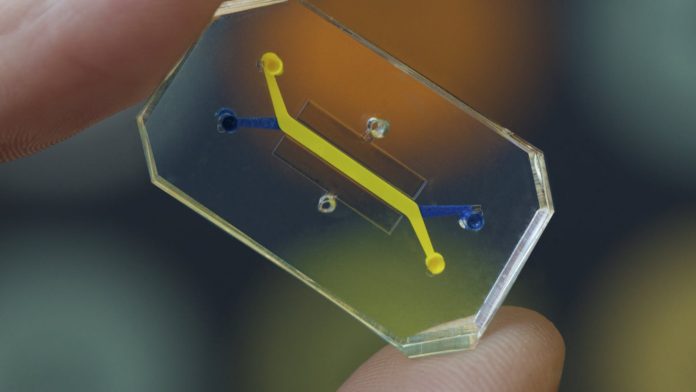A new form of microchip has been developed by researchers at Wyss Institute that can replicate the functions of various living organs including the kidney, lung, skin, bone marrow, and intestine. These so-called organ-on-chips could revolutionize personalized medicine, drug development, and disease modeling.
Clinical studies do not come cheap and testing just a single compound can cost billions of dollars. As well as the expense, there’s also the lives of the animals being tested on to consider too. Not only that, but animals don’t always mimic the human body exactly, and sometimes research can end up being for nothing. For these reasons and more scientists need to develop a way to model human diseases in order to create the perfect wave of advanced, personalized treatments.
The microchips that the Wyss researchers have developed take away the need for animal testing. Instead, each organ-on-chip is made up of a flexible polymer that contains hollow microfluidic channels that are lined with living human cells. They mimic human organs effectively including the breathing motion in the lungs as well as deformations in the intestine. Because of the chips’ ability to host and combine different tissue and cell types that make up human organs they provide a fantastic model for mimicking human pathophysiologies which have enabled researchers to come up with an efficient form of treatment as a result.
Research into this area opens up new possibilities to delve deeper into how environmental factors such as carbon monoxide and cigarette smoke affect tissue health as demonstrated in a smoking machine designed to replicate smoking behavior and how it affects the function of human lung airway. The researchers also developed an instrument that can automatically link organs-on-chips together via common vascular channels. Designed to mimic the whole human body, this instrument has the ability to control fluid flow and cell viability while allowing real-time observation of the cultured tissues.
This new organ-on-chip technology will be used to design new personalized treatments which are both safer and more effective. The chips and other related automated instruments are being developed by Wyss Institute startup company, Emulate, Inc. They’re being improved in an attempt to commercialize the technology to enable various academic institutions, research facilities, pharmaceuticals and other companies to benefit from the chips.
More News to Read
- Meet Robo R2 – The High-Performance 3D Printer With WiFi
- Scientists Discover a New Way to Repair DNA
- Your Newborn Baby Keeps you Up All Night, Tranquilo Mat Here to Help
- Potential Treatment Discovered for Controlling Bleeding Brains After Strokes
- Hubble Telescope Reveals Unusual Object in the Asteroid Belt

